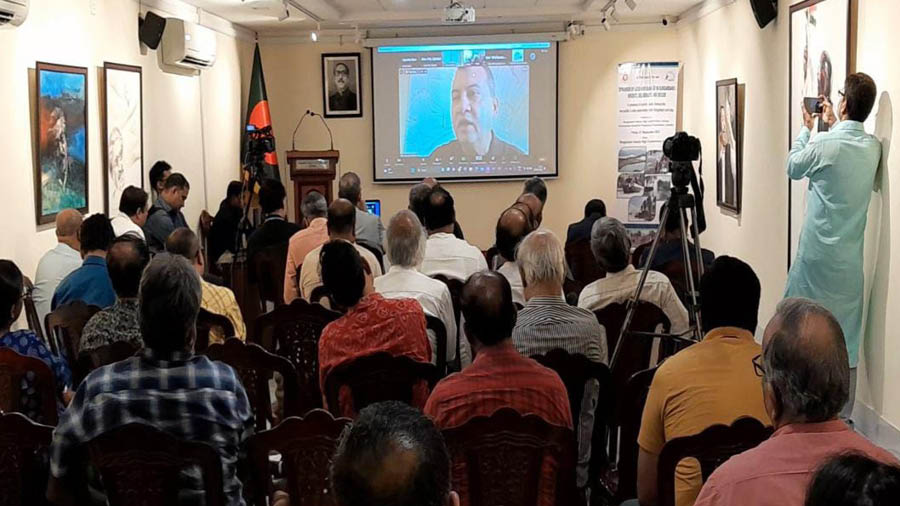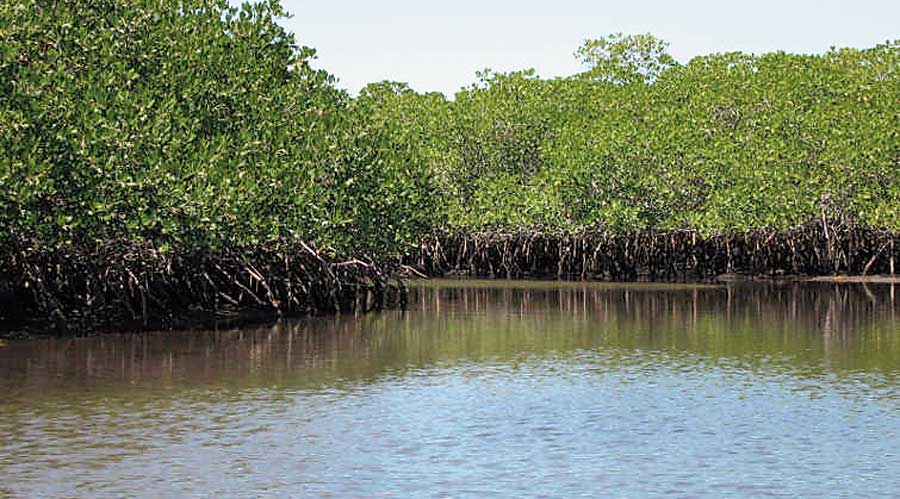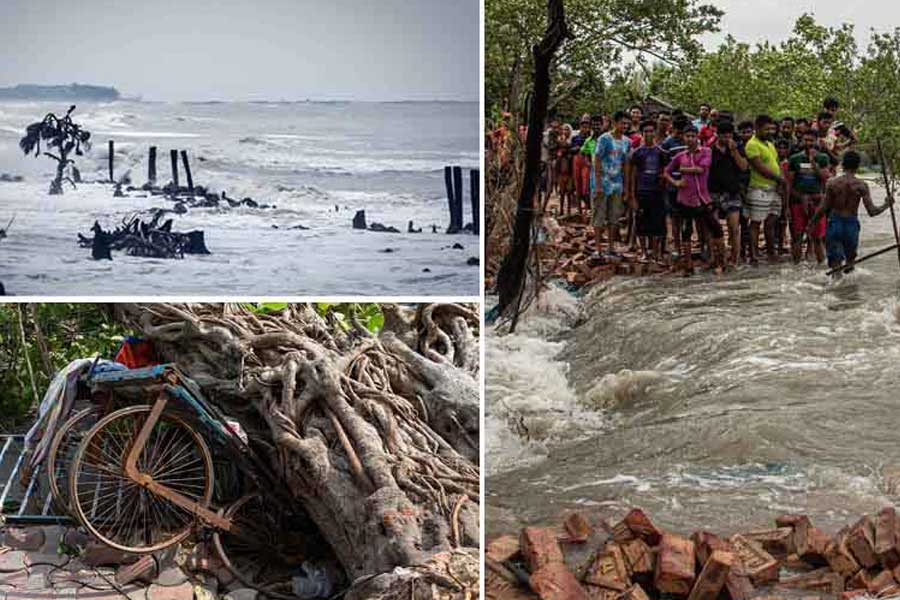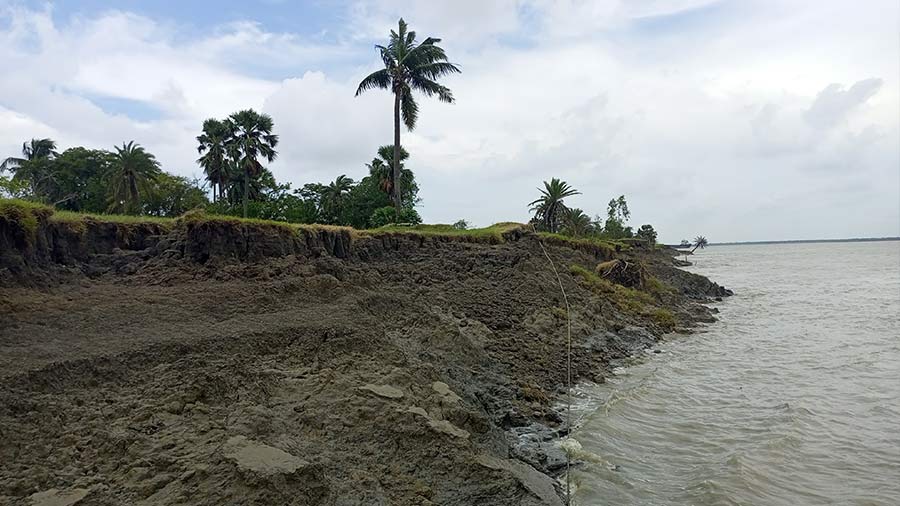Senior climate change experts from India and Bangladesh have underlined the need to have financial support from developed countries as well as argued in favour of exploring innovative funding sources to compensate for the climate-linked loss and damage in the Sunderbans.
The experts agreed that a joint India-Bangladesh stakeholder narrative on Sunderban’s climate inflicted loss and damage at global platforms, including in the ensuing COP 28 in Dubai, would be critical to scout for the support.
Climate impacts in Sunderbans, a world heritage site that is split between West Bengal in India and Bangladesh, have a bearing on about eight million people across the borders; a sizeable population has already been affected multiple times, apart from on its unique ecosystem, including iconic Bengal tigers.
The region is a global climate hotspot with multiple climate drivers operating; often in tandem. The list includes an increasing number of high-intensity cyclones, a level of sea-level rise that is around double to global average, rising short-term rainfall and temperature among others.
The climate triggered loss and damage of Sunderbans has come into prominence since a global loss and damage fund facility was created in COP 27 last year at Sharm El Sheikh; which is expected to be taken further forward in COP 28.
The Bangladesh deputy high commission in Kolkata, along with city-based non-profit Environment Governed Integrated Organisation (EnGIO), recently organised a meeting. Saber Hossain Chowdhury, special envoy to Bangladesh Prime Minister Sheikh Hasina on climate change, West Bengal irrigation secretary and nodal for Sunderbans programme Prabhat Mishra; state disaster management secretary Dushyant Narial, Bangladesh deputy high commissioner Andalib Elias among others attended the meeting.
Harjeet Singh, a member of the UN loss and damage transitional committee and attached to Climate Action Network International, accepted that despite the high vulnerability of the region, Sunderbans climate change is still not recognised adequately at the international level. “Sunderbans is definitely entitled to get loss and damage support,” the expert told The Plurals on Friday.
Singh pointed out that the UN loss and damage transitional committee discussion has been progressing very slowly and few developed countries are putting up hindrances in loss and damage fund structure taking shape. “We demand that independent money should flow to developing countries for supporting loss and damage,” added Singh.
Ecological economist and head of think tank Observation Research Foundation’s Kolkata chapter Nilanjan Ghosh said while ensuring financial support from developed countries is critical, it is also important to tap wider sources and innovative funding like linking it to corporate social responsibility (CSR) funding for tackling loss and damage in the island region.
“We need to identify potential donors, prioritise grants over loans and think of taxing fossil fuel to generate money,” said Ghosh, adding that it was extremely important to assess the value of loss and damage already occurring in the Sunderbans. The expert observed that the value of the variables like property loss, loss of human capital, livelihood loss, and loss of ecosystem services should be considered in the assessment.
Ainun Nishat, a climate expert from Bangladesh, emphasised the need to prioritise adaptation in the Sunderbans and pointed out that till now no guarantee on loss and damage fund had been provided by developed countries.
“Adaptation is necessary but in the case of Sunderbans, we seem to have gone beyond it, with issues of sea-level rise and salinity becoming really huge … loss and damage support is critical,” said Qazi Kholiquzzaman Ahmad, a professor at Dhaka University and a long-term climate negotiator for Bangladesh.
Aarti Khosla of Climate Trends underlined the importance of finding the correct financing mechanism of supporting loss and damage for the Sunderbans and stressed on innovative funding, including a push for increasing donor base for the cause. “We should try out some pilots in,” added Khosla and expressed that the framework of loss and damage support would be clearer in Dubai.
Sundarbans climate risk is a global agenda; needs a joint narrative

Saber Hossain Chowdhury, special envoy to Bangladesh Prime Minister Sheikh Hasina, speaks on climate change at the meeting
“Climate change impacts in the Sunderbans should be seen as a global common... A narrative should be created to focus on the possible loss and damage of transboundary,” said Saber Hossain Chowdhury, special envoy to Bangladesh Prime Minister Sheikh Hasina on climate change; who spoke online from New York, where he was taking part in a ministerial meeting on loss and damage.
“We will soon come up with the meeting outcome report and based on that, expect to build up a joint stakeholder narrative on transboundary Sunderban’s climate inflicted past and potential loss and damages,” said a representative from EnGIO that has been working on transboundary Sunderban’s climate change since 2010.
“Sunderbans is common heritage for all of us. Previously loss and damage issue was not generally included in the discourse of climate change but after the Sharm El-Sheikh climate COP, the situation has changed,” said Andalib Elias, deputy high commissioner for Bangladesh, Kolkata, adding that the meeting would help to understand the issue properly and identify the common grounds.
“We expect Sunderbans to feature in Dubai loss and damage related discussion and the joint narrative will be a useful tool in that context,” said Sanjay Vashist of Climate Action Network South Asia, who stressed that both economic and non-economic loss and damages should be considered.


